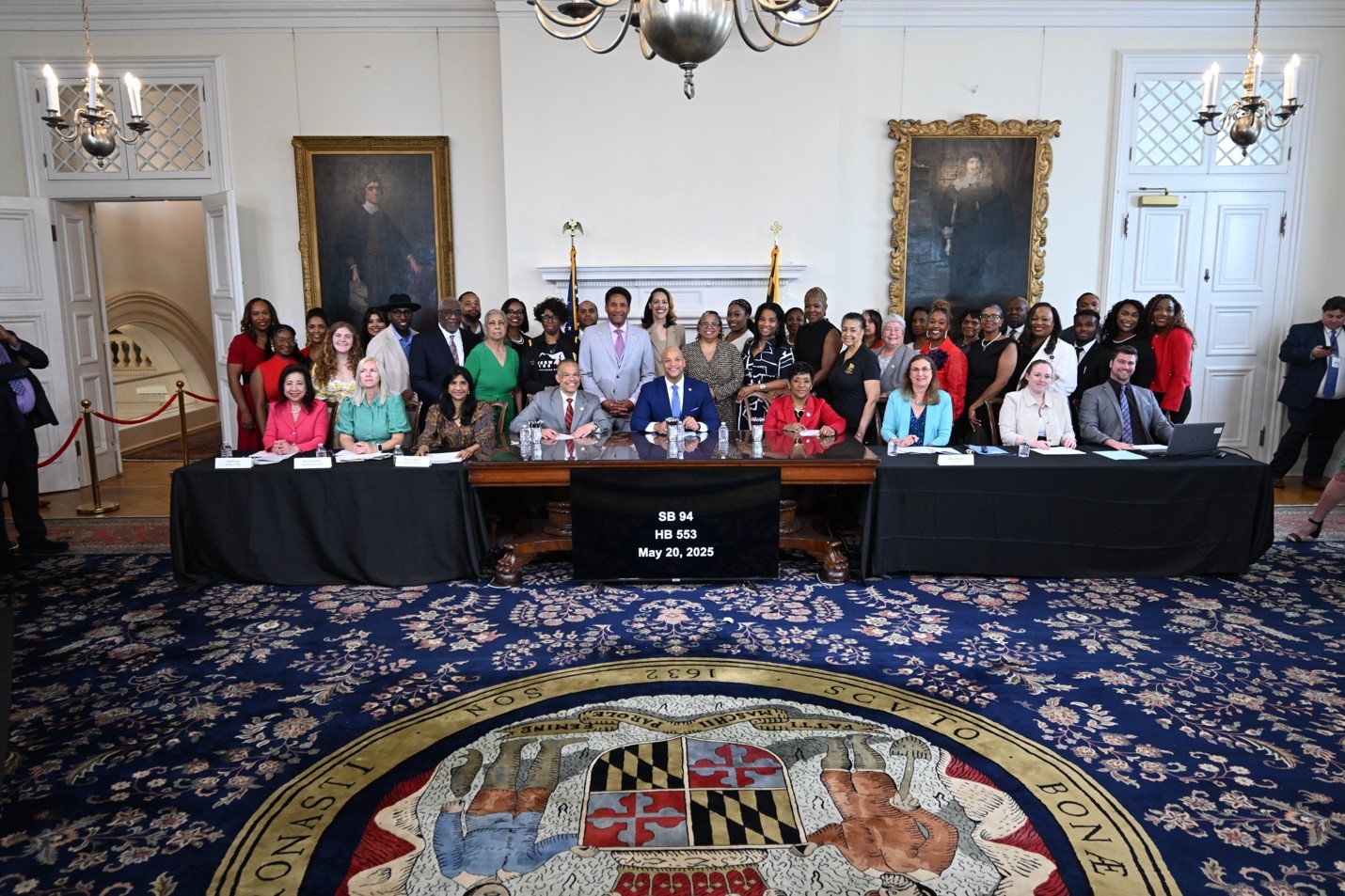Earlier this year, Dr. Yvonne Commodore-Mensah and I advocated on behalf of policy to expand Medicaid coverage for self-measured blood pressure (SMBP) monitoring for pregnant and postpartum individuals across Maryland. On January 28, 2025, we testified before the Maryland Senate Finance Committee in support of Senate Bill 94, sponsored by Senator Arthur Ellis. Just weeks later, we returned to provide virtual testimony to the House Health and Government Operations Committee in support of its companion, House Bill 553.
We’re now proud and honored to share that these bills have officially been signed into law as Chapter 715 in the state of Maryland. Starting January 1, 2026, the Maryland Medical Assistance Program will reimburse for SMBP devices, remote monitoring, and related educational supports for eligible recipients.

The signing of this bill reflects the collective effort of Dr. Commodore-Mensah and me, working closely with Senator Ellis and his team over the past several months to understand the challenges, elevate the research, and help shape a policy solution rooted in both evidence and community need.
Having the opportunity to witness Governor Wes Moore sign this bill into law was a historic moment that beautifully marked the culmination of my doctoral training at Johns Hopkins. Sharing this moment with my advisor, Dr. Commodore-Mensah, made the experience even more special, as her guidance and mentorship throughout my doctoral journey have deeply shaped the researcher and advocate that I am.
There was no more meaningful day to witness my dissertation findings directly influence policy change than on the very day I graduated. Walking across the stage and then immediately traveling to Maryland’s State Capitol to see this bill signed into law was a profound reminder of why I pursued this path to turn research into action and advance health equity through policy.
A Shared Effort Rooted in Community
This achievement didn’t happen in isolation. It reflects years of work rooted in research, community partnerships, and the shared belief that equitable maternal health is a right, not a privilege.
During our testimony in support of these bills, we had the opportunity to highlight findings from two key studies: the SAFE HEART Women Study, which I led as part of my dissertation, and the LINKED-BP trial, led by Dr. Commodore-Mensah and others. The SAFE HEART study underscored how social and psychological risks contribute to cardiovascular disparities among women of reproductive age, particularly Black and Hispanic women. In contrast, the LINKED-BP trial provided strong evidence for SMBP when combined with community health worker support. Together, these findings helped illustrate both the need for more proactive solutions in maternal health and the viability of SMBP as a scalable intervention to address persistent disparities in Maryland.
We were joined in our advocacy by a powerful coalition, including the American Heart Association, Maryland Department of Health, MedChi, ACOG, and several Federally Qualified Health Centers. Alongside these partners, we were also grateful for the support of our colleagues at Johns Hopkins, including faculty members like Drs. Kelly Bower and Ashley Gresh, who contributed written testimony, and Natalia Barolin, Senior Health Policy Advisor at the School of Nursing, whose guidance and feedback helped shape our policy messaging and testimony.
What This Means to Me
As a nurse scientist early in my career, I never imagined I would be involved in policymaking so soon, especially while still completing my doctoral training. It has been incredibly rewarding to see how the data collected from my dissertation, both the numbers and the stories, could be used to inform real policy change. Sharing the lived experiences of women in our study in a way that translated into a legislative solution grounded in community needs has been one of the most powerful parts of this journey.
This experience reshaped how I think about the role of research in driving change. Policy engagement should not be treated as an afterthought or something that comes after the research is complete. It should be embedded into the foundation of how we approach our work. From the beginning, we must consider how evidence can support systemic transformation, and how partnerships with policymakers can translate findings into meaningful action.

Nurses at the Policy Table
Throughout this journey, one truth has become crystal clear: nurses belong in every room where decisions are made, especially those that shape health policy. Our training prepares us to understand the science, but it’s our day-to-day work, our relationships with patients, our deep ties to the community, and our insight into what’s not working that equips us to imagine and help build better systems.
We need more nurses to recognize their value in these spaces. Our voices carry experience, urgency, and vision. We are not just implementers of care, we are architects of change. This legislation stands as living proof of what’s possible when nurses are heard.

I look forward to witnessing the implementation of this law in the years ahead and remaining engaged in efforts to advance maternal health in Maryland. From a single conversation to a signed law, this journey affirmed what is possible when research, advocacy, and community come together. I will carry this moment with me not only as a defining chapter of my doctoral experience, but as lasting inspiration to lead work that is rooted in purpose, shaped by evidence, and driven by impact.
About The Author:
Dr. Faith Elise Metlock graduated from the Johns Hopkins School of Nursing in May 2025 with her PhD. Her research focuses on social determinants of health and their impact on the prevention and self-management of cardiovascular conditions in underserved groups.

